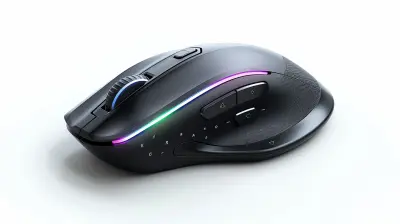12 January 2025
In today’s fast-paced world where wellness and fitness have become top priorities, fitness trackers have emerged as the go-to gadget for many. Whether you're a gym enthusiast, a weekend warrior, or just someone trying to stay active, chances are you've either used or at least considered using a fitness tracker. These devices claim to monitor everything from your steps to your sleep, calories burned, heart rate, and even stress levels. But how accurate are fitness trackers, really?
In this article, we’ll debunk the most common myths surrounding fitness trackers and dive into the facts, helping you understand how much you can trust your device. And hey, you might just be surprised by what we uncover!
![]()
Table of Contents
1. What Exactly Do Fitness Trackers Measure?2. Are Fitness Trackers Accurate When Counting Steps?
3. Heart Rate Monitoring: Can Fitness Trackers Be Trusted?
4. Sleep Tracking: How Well Do Fitness Trackers Track Sleep?
5. Calorie Burn Estimates: Fact or Fiction?
6. Fitness Tracker Myths: What You Shouldn’t Believe
7. Understanding the Limits of Fitness Trackers
8. Final Thoughts: Should You Rely on Fitness Trackers?
What Exactly Do Fitness Trackers Measure?
Before we dive into accuracy, let’s first understand what fitness trackers are designed to measure. These tiny devices pack a punch, combining various sensors with smart algorithms to give you insights into your health and activity levels. Here's a breakdown of the most common metrics:- Steps: Using accelerometers, trackers estimate the number of steps you take based on motion patterns.
- Heart Rate: Optical heart rate sensors use light to detect blood flow and estimate your pulse.
- Calories Burned: Based on your activity levels, heart rate, and personal details like weight and age, trackers estimate how many calories you’re burning.
- Sleep: Trackers use a combination of motion sensors and heart rate data to estimate how long and how well you sleep.
- Stress Levels: Some advanced trackers estimate stress levels by looking at heart rate variability (HRV).
Sounds impressive, right? But the real question is: how accurate are these measurements?![]()
Are Fitness Trackers Accurate When Counting Steps?
Let’s face it, step counting is the bread and butter of fitness trackers. Whether you're aiming for the magical 10,000 steps per day or just trying to move more, knowing how accurate your step count is can make a big difference.The Science Behind Step Counting
Fitness trackers use accelerometers—tiny sensors that detect movement—to count your steps. These sensors measure motion in three planes (up, down, and sideways) and translate that into steps. So, each time your wrist moves in a way that resembles walking, it logs a step.The Accuracy Debate
Is it perfect? Not exactly. Fitness trackers can get confused:- False Positives: If you're sitting at your desk and move your arm a lot, the tracker might think you're walking even though you're not.
- Missed Steps: On the flip side, if you're walking very slowly or taking tiny steps (like when you're strolling around the house), the tracker might miss some of your steps.
The Verdict
In general, fitness trackers are reasonably accurate at counting steps, but they’re not flawless. For most people, the occasional missed or extra step won’t make a huge difference. However, if precision is super important to you, keep in mind that step counting is more of an estimate than an exact science.Heart Rate Monitoring: Can Fitness Trackers Be Trusted?
Another major selling point of fitness trackers is their ability to monitor your heart rate. Whether you're working out or just going through your day, knowing your heart rate can give you valuable insight into your health. But how accurate are these heart rate readings?How Do Fitness Trackers Measure Heart Rate?
Most fitness trackers use optical heart rate sensors, which shine a light into your skin and measure the blood flow in your veins. Sounds high-tech, right? It is, but there are some limitations.The Accuracy Problem
- Resting Heart Rate: When you're sitting still, fitness trackers tend to do a pretty good job of measuring your heart rate.- During Exercise: Once you start moving, things get trickier. The movement of your wrist can interfere with the optical sensor, leading to less accurate readings, especially during intense activities like running or weightlifting.
In fact, studies have shown that heart rate measurements can be off by as much as 10-20 beats per minute during high-intensity workouts. So, while your fitness tracker might give you a general idea of your heart rate, don’t rely on it for super-precise readings—especially if you're an athlete or training for a specific heart rate zone.
Sleep Tracking: How Well Do Fitness Trackers Track Sleep?
Ah, sleep tracking. We all want to know how well we’re sleeping, and fitness trackers promise to give us that insight. But can you really trust them to track something as complex as sleep?How Sleep Tracking Works
Most fitness trackers rely on two things to track your sleep: motion and heart rate. When you stop moving for a while, the device assumes you're asleep. Then, based on your heart rate and how much you move throughout the night, it estimates the stages of sleep (light, deep, and REM).The Accuracy of Sleep Data
While fitness trackers can give you a rough idea of how long you’ve slept, they’re not great at distinguishing between sleep stages. There’s a lot more to sleep than just lying still, and most trackers don’t have the technology to track brain activity—the gold standard for sleep analysis.So, while your fitness tracker might tell you that you were in "deep sleep" for 2 hours, take that with a grain of salt. It's more of an educated guess than an exact measurement.
Calorie Burn Estimates: Fact or Fiction?
If you’re trying to lose weight, tracking how many calories you burn can be super helpful. But are the calorie burn estimates on your fitness tracker accurate?How Fitness Trackers Estimate Calorie Burn
Fitness trackers estimate calorie burn based on a combination of your heart rate, activity levels, and personal information like age, weight, and gender.The Reality
Here’s the harsh truth: calories burned estimates are usually way off. Studies have shown that fitness trackers can overestimate calorie burn by as much as 20-30%. The reason? They don’t take into account factors like your metabolism or the intensity of your workout. So, while these estimates can give you a general idea, don’t rely on them to be 100% accurate.Fitness Tracker Myths: What You Shouldn’t Believe
With fitness trackers becoming more popular, a lot of myths have started to circulate. Let’s debunk a few of them:Myth #1: Fitness Trackers Are Always Accurate
As we’ve already covered, fitness trackers are not perfect. While they provide useful data, they’re not medical devices, and their accuracy can vary depending on factors like movement, device placement, and activity type.Myth #2: More Expensive Trackers Are More Accurate
While it's true that higher-end fitness trackers come with more features, that doesn’t necessarily mean they’re more accurate. Many budget-friendly trackers use the same sensors as their pricier counterparts. What you're paying for is often the extra features and brand name, not necessarily better accuracy.Myth #3: Fitness Trackers Can Replace Professional Health Monitoring
Fitness trackers are great for giving you insights into your activity levels, but they’re no match for professional medical equipment. If you're looking for precise medical data, always consult a healthcare professional.Understanding the Limits of Fitness Trackers
Okay, so fitness trackers aren’t perfect. But does that mean they’re useless? Absolutely not! In fact, despite their limitations, fitness trackers can be incredibly beneficial for most people.The Benefits of Fitness Trackers
- Encouragement to Move: One of the best things about fitness trackers is that they encourage you to be more active. Whether it’s hitting your step goal or closing those activity rings, these devices are great motivators.- General Health Insights: While the data might not be 100% accurate, it can still give you valuable insights into your habits. Are you moving enough? Are you getting enough sleep? These are all good questions that fitness trackers can help answer.
- Improving Over Time: Fitness tracker companies are constantly improving their technology. So, while today’s devices might not be perfect, future versions will likely be more accurate.
The Key to Success? Use It as a Guide, Not a Gospel
The most important thing to remember is that your fitness tracker is a tool. It’s there to guide you and give you insights, but it’s not the be-all and end-all. Use it as a motivator, but don’t obsess over the numbers.Final Thoughts: Should You Rely on Fitness Trackers?
So, how accurate are fitness trackers? The answer is that they’re good at giving you a general idea but not perfect. From step counting to heart rate monitoring, sleep tracking, and calorie estimates, fitness trackers provide valuable insights—but they’re not medical devices.At the end of the day, fitness trackers are about helping you build healthier habits. Don’t stress too much over the numbers. Instead, focus on the bigger picture: Are you moving more? Sleeping better? Feeling healthier?
If the answer is yes, then your fitness tracker is doing its job.










Mateo McKinstry
This article provides valuable insights into the real accuracy of fitness trackers, emphasizing the importance of understanding their limitations while still benefiting from their usage.
March 28, 2025 at 4:05 AM